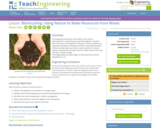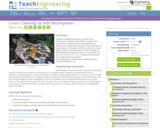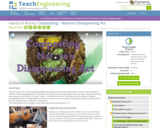
Students decompose an irregular polygon into arrays to find the area.
- Subject:
- Mathematics
- Material Type:
- Lesson Plan
- Provider:
- BetterLesson
- Date Added:
- 12/01/2022

Students decompose an irregular polygon into arrays to find the area.

Biology 2e is designed to cover the scope and sequence requirements of a typical two-semester biology course for science majors. The text provides comprehensive coverage of foundational research and core biology concepts through an evolutionary lens. Biology includes rich features that engage students in scientific inquiry, highlight careers in the biological sciences, and offer everyday applications. The book also includes various types of practice and homework questions that help students understand—and apply—key concepts. The 2nd edition has been revised to incorporate clearer, more current, and more dynamic explanations, while maintaining the same organization as the first edition. Art and illustrations have been substantially improved, and the textbook features additional assessments and related resources.


By the end of this section, you will be able to do the following:
Describe the role that protists play in the ecosystem
Describe important pathogenic species of protists

By studying key processes in the carbon cycle, such as photosynthesis, composting and anaerobic digestion, students learn how nature and engineers "biorecycle" carbon. Students are exposed to examples of how microbes play many roles in various systems to recycle organic materials and also learn how the carbon cycle can be used to make or release energy.

Students bury various pieces of trash in a plotted area of land outside. After two to three months, they uncover the trash to investigate what types of materials biodegrade in soil.

Imagine 31 numbers have been organized in ascending order in a list by a computer program. Now the program has to find a number in the list, but it can only look at one number at a time. Is it easier to find the number now, than if they were in a random order?

How would you look for a book in a library if the books were sorted in alphabetical order? Is that easier than if they were out of order?

Watch this screencast introducing several common types of chemical reactions. [1:36]

Students investigate decomposers and the role of decomposers in maintaining the flow of nutrients in an environment. Students also learn how engineers use decomposers to help clean up wastes in a process known as bioremediation. This lesson concludes a series of six lessons in which students use their growing understanding of various environments and the engineering design process, to design and create their own model biodome ecosystems.

In a multi-week experiment, students monitor the core temperatures of two compost piles, one control and one tended, to see how air and water affect microbial activity. They daily aerate and wet the "treated" pile and collect 4-6 weeks' worth of daily temperature readings. Once the experiment is concluded, students plot and analyze their data to compare the behavior of the two piles. They find that the treated pile becomes hotter, an indication that more microbes are active and releasing heat. Through this activity, students see that microbes play a role in composting and how composting can be used as a carbon management process.

Students explore the concept of biodegradability by building and observing model landfills to test the decomposition of samples of everyday garbage items. They collect and record experiment observations over five days, seeing for themselves what happens to trash when it is thrown "away" in a landfill environment. This shows them the difference between biodegradable and non-biodegradable and serves to introduce them to the idea of composting. Students also learn about the role of engineering in solid waste management.

Students design and conduct experiments to determine what environmental factors favor decomposition by soil microbes. They use chunks of carrots for the materials to be decomposed, and their experiments are carried out in plastic bags filled with dirt. Every few days students remove the carrots from the dirt and weigh them. Depending on the experimental conditions, after a few weeks most of the carrots will have decomposed completely.

Students explore measurements of geometric figures in two-and three-dimensions, finding area, surface area, and volume in mathematical and real-world problems.

Students learn about energy and nutrient flow in various biosphere climates and environments. They learn about herbivores, carnivores, omnivores, food chains and food webs, seeing the interdependence between producers, consumers and decomposers. Students are introduced to the roles of the hydrologic (water), carbon, and nitrogen cycles in sustaining the worlds' ecosystems so living organisms survive. This lesson is part of a series of six lessons in which students use their growing understanding of various environments and the engineering design process, to design and create their own model biodome ecosystems.

Students conduct experiments to determine what environmental factors favor decomposition by soil microbes. They use chunks of carrots for the materials to be decomposed, and their experiments are carried out in plastic bags filled with dirt. Every few days students remove the carrots from the dirt and weigh them. Depending on the experimental conditions, after a few weeks most of the carrots have decomposed completely.

Listen and learn about different types of chemical reactions such as combination, combustion and decomposition. Learn different steps on how to write combustion equations and view how single displacement reaction occurs.

Students observe the decomposition of a pumpkin under controlled circumstances. These observations are used to take notes and develop questions.

This website explains and defines basic subtraction. There are practice problems at the very end of this lesson.